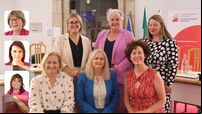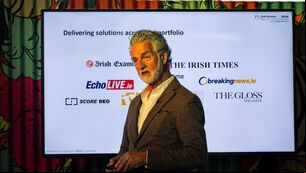Urgent need to upgrade specialist units for older people at Cork University Hospital
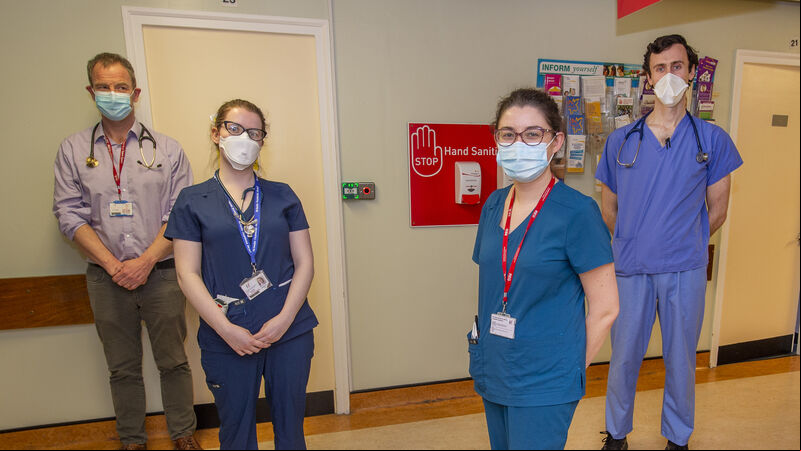
Dr Mike O'Connor, consultant geriatrician, Dr Shona Burke, registrar in geriatric medicine, Dr Deirdre Murphy, registrar in geriatric medicine, and Dr Denis Curtin consultant geriatrician on Ward 1A at the Cork University Hospital. Picture: Dan Linehan
Dr Emer Ahern offers advice on how to live better for longer. She talks to .

Living to 100 years of age will soon become a routine fact of life. The prediction is that more than half the babies born in wealthier countries since 2000 may reach their 100th birthdays. By 2036, more than one in five Irish people are expected to be aged 65 years or older.
So what can we do now to ensure we live those years healthy and well. Dr Emer Ahern, consultant geriatrician at Cork University Hospital (CUH) points to the simple message from Ageing Well Week ‘Eat, Walk and Talk’.
Our longevity, or life expectancy, is 20% determined by our genes. Other key determinants, health and wellbeing, are in our hands and future proofing for our older years needs to start earlier than you first thought.
The Irish Longitudinal Study on Ageing (Tilda), conducted by Trinity College Dublin, studies the health and wellbeing of older adults in Ireland. They found that having a purpose in life and ‘belonging’, being part of a community of people eg local church, GAA are key elements when talking about ageing well. “Having strong ive connections and relationships with our family and friends are hugely important for older adults physically and mentally.”
Dr Ahern says Covid-19 showed us the important role technology plays not just in helping older people stay connected via social media apps and other platforms but also in delivering healthcare.
The greatest potential for technology to improve healthcare she says is for our older patients because there is so much complexity to the care they receive. Organisations such as ALONE have the BConnect service which provides and training in the use of technology for older adults.
Exercise is key when it comes to ageing well. Dr Ahern stresses the importance of incorporating exercise into your daily life so walking to the post office, to work, gardening etc.
“No matter what your age or level of ability, regular movement or exercise throughout the day benefits our physical, mental and overall wellbeing. No one-size-fits-all and it is important to find activities that suit your health needs, level of ability and confidence, are enjoyable and can be done easily and often.”
Diet is important for longevity, so we are advised to eat fruit and vegetables, protein rich foods for your muscles (eg poultry and fish), dairy products with calcium and vitamin D for your bones, healthy unsaturated fats (e.g. olive oil, nuts) low salt, foods rich in fibre (e.g. porridge).
Looking after older adults, Dr Ahern says, is a real privilege. Cork University Hospital (CUH) Department of Geriatric Medicine strives to provide exceptional, safe, inter-disciplinary care focused to the individualised needs of older adults.
CUH is the largest university teaching hospital in Ireland and the only Level 1 Trauma centre in the country due to the presence of over 40 different medical and surgical specialties on the campus.
As the Irish population is ageing, Dr Ahern says our healthcare system must adapt to the unique needs of this patient group.
“Older patients utilise healthcare across all specialties and sectors. As people age, their health needs tend to become more complex and an unprepared system results in increased risk of harm,” said Dr Ahern.
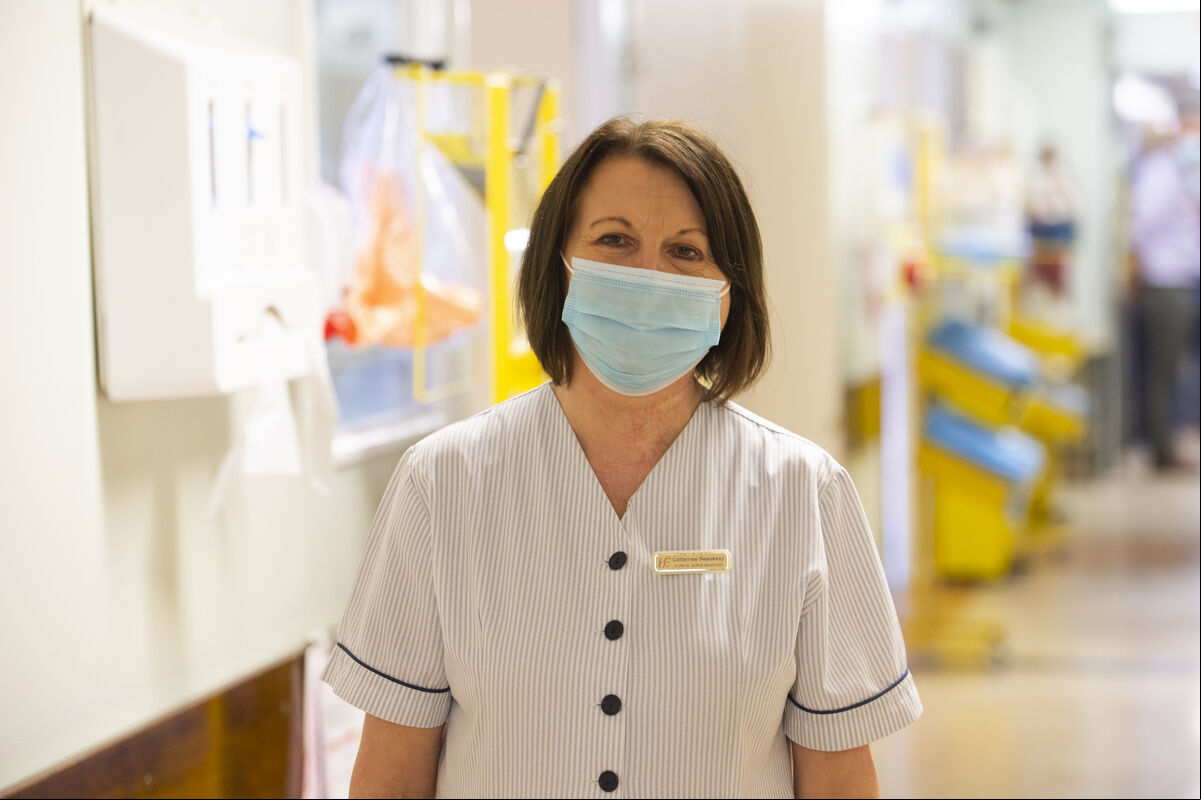
At present, 30-35 people over 75 years of age attend CUH emergency department every day (12,500 patients per annum). For over 55% of these patients ission is necessary for acute care for eg hip fracture, stroke, infection. Approximately 700 older people from nursing homes are itted to CUH each year.
The number of older patients presenting to CUH is increasing by 6.9% year on year, resulting in older people being amongst the principal service s of CUH.
However, healthcare systems and teams are often not designed or attuned to provide age-friendly care which optimises outcomes in older adults. Deg age-friendly clinical environments and measuring the quality of care delivered to older adults have become even more important during the Covid-19 pandemic with older adults at the highest risk of death and poor outcomes and visiting from family and friends restricted.
“Our vision is to provide exceptional inter-professional and individualised care for every older adult who presents to CUH with safe, efficient transitions of care in partnership with patients and their family and friends, while promoting independence and well-being for all older adults.”
Dr Ahern says the specialist areas for older adults in CUH are in urgent need of a redesign.
Given the number of older adults who use the services of CUH and the predicted demographic change over the next 10 years, Dr Ahern says this work is vital.
She says a combination of evidence based quality measures and appropriately designed environments are imperative.
One of the most difficult things she has had to witness she says over the past year is seeing older people die on the ward without all their family or friends who love them.
“Culturally and professionally in Ireland we care for people who are dying in hospital very well. With older adults we are especially cognisant of the life lived and loved by so many. We see the grieving and healing process start with family and friends being at the bedside when the person dies and in truth we ourselves are also comforted by this ‘ritual ‘of celebrating and honouring the life of the person we had tried over the past days and weeks to make better. This has been erased by Covid-19 and is the hardest and saddest for us to reconcile with.”
The Geriatric Emergency Multidisciplinary Service (GEMS) is a team within the Department of Geriatric Medicine. In February 2021, it was the first healthcare system in Europe to achieve recognition as an Institute for Healthcare Improvement Age-Friendly Health System (AFHS).
This initiative implemented evidence-based care to older patients attending the Emergency Department (ED) and prioritises what matters most to older adults and their family and friends. This initiative also created an age-friendly environment.
Multidisciplinary working, Dr Ahern says, is the foundation of successful specialist geriatric medicine care and this is why she says age attuned staff and age-friendly practice and environment is urgently needed.
“Our Geriatric Medicine specialist ward has 35 beds and 25 of these are allocated to acute geriatric medicine services. This is an insufficient bed allocation, given the numbers of older adults in CUH at any one time (usually over 50% of in-patients).”
Currently, she says the ward is unsuitable for the care of older patients with complex multidimensional needs including cognitive impairments like dementia and delirium.
The ward, she says, has not been structurally modified since CUH was originally constructed in 1979. It urgently requires substantial re-design and investment in order to be age-attuned and to meet the needs of older patients and their families.
The CUH charity funding will be used to create an environment in which age-friendly care can be delivered on the specialist geriatric medicine inpatient unit. The clinical environment will be re-designed and adapted to lead age-friendly care in CUH.
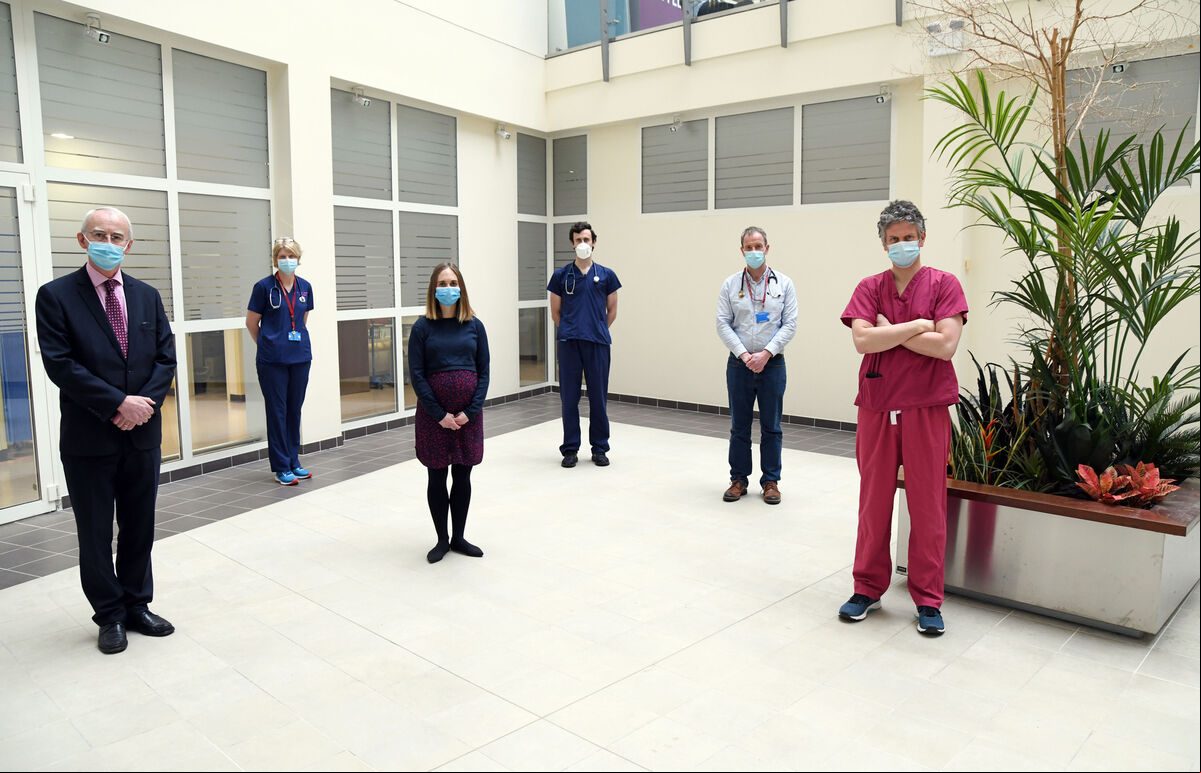
Dr Ahern says an inter-disciplinary, team trained in geriatric and gerontology to guide and inform this process has been established. Specifically, dedicated space will be designed and equipped to provide care for patients with memory and sensory impairment.
The Department of Geriatric Medicine at CUH intends to work with CUH and HSE to become accredited by the Institute for Healthcare Improvement as an age-friendly health system.
Visit CUH Charity for information on how to services for elderly patients at Cork University Hospital.



